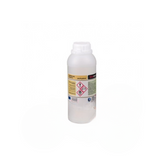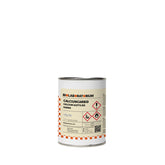Jojoba Oil – Versatile, sustainable, and safe
Jojoba oil is a fascinating natural product that has gained increasing attention in industry and households in recent years. This unique oil, extracted from the seeds of the jojoba plant, is characterized by a variety of useful properties and is used in numerous application areas.
In this blog post, we want to take a closer look at jojoba oil – from its chemical properties to technical applications and questions of safety and sustainability. Let yourself be inspired by the versatility of this remarkable natural product!
The jojoba plant and its seeds
The jojoba plant (Simmondsia chinensis) is an evergreen shrub native to the desert regions of North America. For centuries, the indigenous peoples of these areas have used the plant's seeds to obtain high-quality oil.
The seeds of the jojoba plant are about 2 cm long and contain a high proportion of fat – up to 50% of their weight. This fat mainly consists of long-chain wax esters, which give jojoba oil its unique properties.
Chemical composition and properties of jojoba oil
Jojoba oil is not a classic vegetable oil, but rather a wax. Unlike conventional oils, which mainly consist of triglycerides, jojoba oil is composed of over 97% long-chain wax esters. These wax esters give the oil a number of remarkable properties:
High oxidation stability
Jojoba oil is extremely stable against oxidation and rancidity. Thanks to its wax ester structure, it is significantly less susceptible to oxidation processes than conventional vegetable oils. This makes it an ideal lubricant and additive in cosmetic products.
High melting point
The melting point of jojoba oil is about 100°C. This makes it significantly more solid than most other vegetable oils, which makes it interesting for many industrial applications.
Good skin compatibility
Jojoba oil is very well tolerated by the human body and is therefore a popular ingredient in cosmetic products. It is non-irritating, non-comedogenic (meaning it does not clog pores), and even hypoallergenic.
High viscosity
Jojoba oil has a significantly higher viscosity than conventional vegetable oils. This makes it an ideal lubricant and lubricating agent in technical applications.
Good storage stability
Thanks to its oxidation stability, jojoba oil can be stored for a very long time without losing quality. It is therefore a very durable and storable natural product.
Technical applications of jojoba oil
Due to its unique chemical properties, jojoba oil is used in a wide range of industrial sectors. Here are some of the main application areas:
Lubricants and lubricating agents
The high viscosity and oxidation stability make jojoba oil an excellent lubricant for machinery, gears, and other technical applications. It is also used in hydraulic fluids, motor oils, and greases.
Cosmetics and personal care
In the cosmetics and personal care industry, jojoba oil is a widely used ingredient. It is used in creams, lotions, shampoos, lip care products, and much more. Here, its skin compatibility, moisturizing effect, and pleasant skin feel are beneficial.
Textile finishing
Jojoba oil is also used in textile finishing, for example as a sizing for yarns or as a softener for fabrics. It gives textiles a pleasant feel and protects them from soiling.
Food industry
In the food industry, jojoba oil is used as a release agent, lubricant, or antifoaming additive. Due to its safety, it is approved for use in food products.
Pharmaceutical applications
Jojoba oil is also used in pharmaceuticals, for example as an excipient in ointments, creams, or capsules. Here, its skin compatibility and stability are beneficial.
Safety and sustainability of jojoba oil
Jojoba oil is not only versatile in its applications but also a very safe and sustainable natural product:
Safety for humans and the environment
Jojoba oil is food-grade and approved for human consumption. It is neither toxic nor harmful to the environment. No health risks occur even with skin contact or inhalation.
Sustainable extraction
The jojoba plant grows in desert regions that are unsuitable for cultivating other crops. Therefore, jojoba cultivation is very environmentally friendly and contributes to the preservation of biodiversity.
High resource efficiency
A large portion of the weight from the seeds of the jojoba plant can be obtained as high-quality oil. This makes cultivation and processing very resource-efficient.
Circular economy
After use, jojoba oil can be easily disposed of or even integrated into circular economy systems. It is biodegradable and can, for example, be reused as a lubricant.
In summary, jojoba oil is not only a versatile and powerful natural product, but also a prime example of sustainable and environmentally friendly industrial chemistry. Whether in cosmetics, technology, or food – jojoba oil is a fascinating raw material with a future.




















